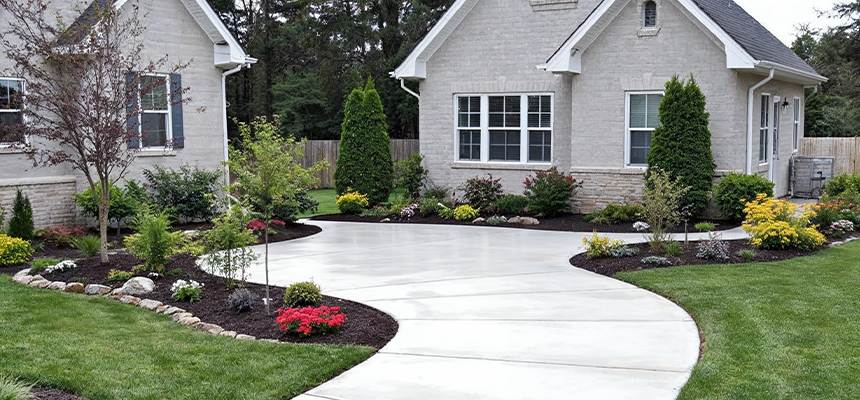Tools Needed for Concrete Work Explained in Detail
Any successful concrete project requires a deep understanding of the tools needed for concrete work. Whether you’re a homeowner planning to undertake some home improvement projects or a budding construction enthusiast, getting familiar with these tools is essential. Not only will these tools help in laying the perfect foundation, but they will also assist in creating aesthetically pleasing concrete walkways, smooth driveways, and well-crafted patios. Understanding the right tools can transform a challenging task into an enjoyable process. With the right information, your concrete projects can become far more manageable and rewarding.

Essential Hand Tools for Concrete Work
1. Shovels
Shovels are indispensable for any concrete work. They help you mix, move, and spread concrete as needed. Without a good shovel, placing concrete accurately would be a near impossibility. It is advisable to have both square-head and round-point shovels available.
2. Trowels
Also crucial to concrete work is the trusty trowel. There are different types like the finishing trowel, which helps achieve a smooth surface, and the pointing trowel for detailed work. Choosing the right trowel can significantly affect the appearance of your final project.
Mechanical Tools That Make a Difference
3. Concrete Mixers
For larger projects, a concrete mixer is non-negotiable. It saves time and ensures the concrete is mixed thoroughly, resulting in better consistency and quality. It’s an investment that pays off in durability and appearance.
4. Vibrators
Concrete vibrators are vital to eliminate air bubbles and ensure the concrete is evenly distributed. This tool is particularly useful when working on patios or floors that need a smooth finish. It’s one of the secrets to achieving professional-grade results at home.
Measuring and Layout Tools
5. Levels and Straightedges
To maintain consistent quality, utilizing levels and straightedges is key. These tools allow for precision, ensuring that every part of your concrete surface is even and balanced.
6. Line Levels and String Lines
Line levels and string lines are perfect for setting up frameworks where your concrete will be laid. They guide you in creating a well-balanced and level structure, serving as the skeleton for your project.
Protection and Clean-Up Tools
7. Safety Gear
Your safety should be a priority. Always equip yourself with gloves, goggles, and sturdy footwear when working with concrete. These items shield you from potential injuries and ensure a safer working environment.
8. Pressure Washers
After completing your project, a pressure washer is invaluable for cleaning up the work area. It helps remove unwanted residue and keeps your tools clean for future use, maintaining their longevity and performance.
Advanced Tools for Specialized Tasks
9. Concrete Saw
In specialized projects requiring precision cutting, a concrete saw is essential. Whether it’s cutting grooves or resizing slabs, this tool provides the accuracy needed for intricate tasks.
10. Screeds
Screeds ensure that your concrete is level and has a flawless finish. They are especially useful for large areas and help create a uniform surface that enhances the beauty of your installation, such as in stamped concrete vs pavers comparisons.
Common Challenges Encountered in Concrete Work
Concrete work can pose various challenges, be it dealing with weather conditions, mix consistency, or curing times. Home improvement enthusiasts should familiarize themselves with common obstacles to prepare adequately. For example, deciding between different concrete types can help address specific needs or objectives in a project.
Dealing with Weather Conditions
Weather impacts concrete drying and curing times. Knowing the appropriate measures to take, like covering concrete during rain or shielding it from excessive sun, ensures durability and reduces the risk of cracking.
Ensuring Mix Consistency
A consistent mix is vital for the quality and strength of your project. Adding too much water can weaken the mix, while too little can make it difficult to work with. Using a concrete mixer can greatly aid in achieving the right balance.

Frequently Asked Questions
1. What are the basic tools needed for small concrete projects?
For smaller projects, essential tools include shovels, trowels, levels, and line markers. Safety equipment is also necessary to protect yourself from potential hazards.
2. Can I rent tools needed for concrete work?
Yes, many hardware and home improvement stores offer equipment rentals. It’s a cost-effective option for those who don’t often engage in concreting tasks, allowing you to access high-quality tools without the need to purchase them outright.
3. How can I improve the finish of my concrete work?
Using the right finishing tools, such as trowels and screeds, can significantly enhance the quality of your surface. Ensuring proper curing and managing environmental conditions effectively will also contribute to a superior finish.
This article contains affiliate links. We may earn a commission at no extra cost to you.
